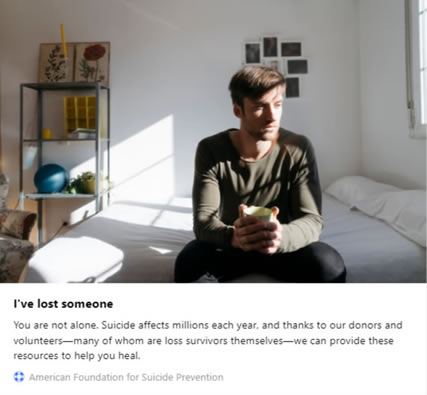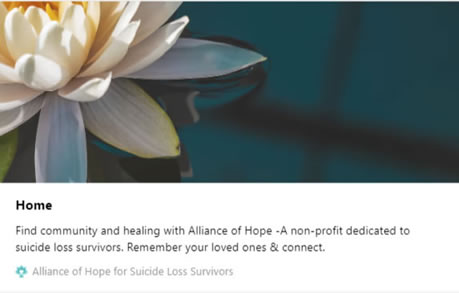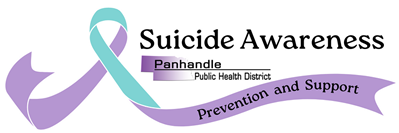
About Suicide
Suicide is more common than you might think and affects all ages. Suicide is the 11th leading cause of death in the US. It was responsible for more than 48,000 deaths in 2021, a 4% increase in the national suicide rate; rising from 13.5 deaths per 100,000 population in 2020 to 14.0 deaths per 100,000 population in 2021.
In the past decade, rural areas have been consistently higher in their suicide rates than urban areas, with suicide rates increasing by 46% in rural areas compared to 27% in urban areas. The number of people who think about or attempt suicide is even higher. Every day 20 young people die by suicide in the United States. In Nebraska, suicide is the 2nd leading cause of death for ages 10-24 years. Youth in Nebraska are affected by suicidal thoughts. According to the 2021 Nebraska Youth Risk Behavior Survey, known as NYRBS:
- 22% of Nebraska high school students reported seriously considering attempting suicide in the past 12 months
- 18% of high school students, during that same period, made a suicide plan
- 10% of surveyed students reported attempting suicide at least once in the 12-month period
Some groups have higher suicide rates than others. Suicide rates vary by race/ethnicity, age, and other factors. The highest rates are among American Indian/ Alaska Native and non-Hispanic White populations. Other Americans with higher-than-average rates of suicide are veterans, people who live in rural areas, and workers in certain industries and occupations like mining and construction. Young people who are lesbian, gay, or bisexual have a higher rate of suicidal ideation and behavior compared to their peers who identify as straight.
For more information on suicide statistics visit AFSP or CDC
Suicidal thoughts are a symptom just like any other. But they can be frightening. It's important to take suicidal thoughts seriously. It's ok to talk about suicide and important to seek help. Suicidal thinking can be treated and improve over time. Evidence shows that if an individual is in crisis and gets the help they need they will likely never be suicidal again. Suicide is NOT the answer.
Panhandle Public Health District coordinates several initiatives to create awareness, prevent suicide, and support those who have lost someone to suicide. PPHD and PPC are working to expand this and other suicide prevention and support programs. Our goal is to ensure that everyone living in the Panhandle has access to the tools, resources, and information needed to have conversations about preventing suicide and to feel comfortable seeking help if needed.
Suicide Prevention
National Crisis Line
The National Suicide & Crisis Lifeline has recently changed to 988. It's now easier to remember the three-digit number 988. #BeThe1To is the 988 Suicide & Crisis Lifeline's message for National Suicide Prevention Month and beyond, which helps spread the word about actions we can all take to prevent suicide. The Lifeline network and its partners are working to change the conversation from suicide-to-suicide prevention, to actions that can promote healing, help, and hope.
Contact the 988 Suicide and Crisis Lifeline anytime 24/7 if you are experiencing mental health-related distress or are worried about a loved one who may need crisis support. Call or text 988 or Chat at 988lifeline.org
Connect with a trained crisis counselor. 988 is confidential, free, and available 24/7/365. Visit the 988 Suicide and Crisis Lifeline for more information at 988lifeline.org. Veterans can dial 988 and press 1 to connect to a specially trained responder.
Question. Persuade. Refer.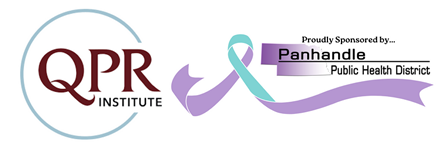
Three steps anyone can learn to help prevent suicide.
Panhandle Public Health District offers ongoing QPR (Question, Persuade, Refer) Suicide Prevention webinars. Our goal is to ensure that everyone living in the Panhandle has the tools to have the essential conversation with someone in crisis and knows what to do to refer to help.
QPR, like CPR, can be a lifesaver. QPR training helps participants recognize the warning signs and risk factors for suicide. QPR empowers people of all ages, stages, and backgrounds with the tools and skills to make a positive difference in the life of someone they know. It is an innovative, practical and proven suicide prevention training.
Monthly QPR webinar trainings are the second Wednesdays at noon in 2024. Register here or contact Cheri Farris at (308) 220-8020 or cfarris@pphd.ne.gov to schedule a webinar or in-person training for your group or organization. Length: 60-75 minutes
Cost: FREE!
PPHD's team of QPR trainers is committed to preventing the tragedy of suicide by ensuring that all of us has the tools we need to inspire hope.
Hope Squad
Hope Squads reduce bullying and youth suicide through education, training, and peer intervention. Hope Squad members are nominated by their classmates as trustworthy peers and trained by advisors.
Hope Squad Objectives
- Hope Squad members will be able to identify skills needed to effectively build relationships within their squad and school.
- Hope Squad members will examine the importance of collaboratively working together.
- Hope Squad members will establish norms necessary to create a culture of inclusiveness.
Hope Squad Advisors strive to:
- Create a safe school environment Promote connectedness
- Support anti-bullying Encourage mental wellness
- Reduce mental health stigma Prevent substance misuse
Panhandle Public Health District is available to train staff and assist with implementing Hope Squad curriculum in area schools. To date, there are 10 area middle and high schools participating in Hope Squad program. Contact PPHD at (308) 633-2866 for more information.
Mental Health First Aid

The Mental Health first Aid initiative contributes significantly to suicide prevention, enhancing community participation in the fight against suicide. Both Youth and Adult Mental Health First Aid trainings are available.
Youth Mental Health First Aid (YMHFA) is an early intervention public education program. It teaches adults how to recognize the signs and symptoms that suggest there may be a mental health challenge, how to listen nonjudgmentally and give reassurance to a person who may be struggling with a mental health challenge, and how to refer a person to the appropriate professional support and services.
Youth Mental Health First Aid is designed to teach parents, family members, caregivers, teachers, school staff, peers, neighbors, health and human services workers, and other caring citizens how to help an adolescent (age 12-18) who is experiencing a mental health or addictions challenge or is in crisis. Youth Mental Health First Aid is primarily designed for adults who regularly interact with young people. The course introduces common mental health challenges for youth, reviews typical adolescent development, and teaches a 5-step action plan for how to help young people in both crisis and non-crisis situations. Topics covered include anxiety, depression, substance use, disorders in which psychosis may occur, disruptive behavior disorders (including AD/HD), and eating disorders. To learn more, download the Mental Health First Aid for Youth one-pager. YMHFA is intended to build strong and resilient youth.
Learn how to recognize the signs and symptoms that suggest a potential mental health challenge, how to listen nonjudgmentally and give reassurance to a person who may be experiencing a mental health challenge, and how to refer someone to appropriate professional support and services. You will learn valuable skills to help a person feel less distress and how to assist them to seek assistance.
For more information, please reach out to Nicole Berosek at nberosek@pphd.ne.gov or (308) 279-3496 Length: 2 hour of on-line pre-work and 6 hours of in person or virtual instruction Cost: FREE!
September Suicide Awareness & Prevention Month Activities & Initiatives
Each September Panhandle Public Health District (PPHD) and the Panhandle Prevention Coalition (PPC) observe Suicide Prevention Month with a range of impactful initiatives aimed at raising awareness, providing support, and ultimately saving lives in the community. Every year, the Lifeline and other mental health organizations and individuals across the U.S. and around the world raise awareness of suicide prevention during September to reduce stigma around suicide, a topic that can be difficult to think and talk about. That’s why we use this month to spread hope and share resources and important information to anyone affected by the tragedy of suicide. Our goal is to ensure that everyone living in the Panhandle has access to the tools, resources, and information needed to have conversations about preventing suicide and to feel comfortable seeking help if needed.
My Ascension Documentary Film
A suicide attempt left 16-year-old varsity cheerleader Emma Benoit paralyzed but propelled her on a mission to use her painful experience to inspire others find hope and stay alive. My Ascension is a feature-length documentary that chronicles Benoit's inspiring journey and quest to walk again as she worked to bring Hope Squad, a school-based suicide prevention program, to high schools in her home state of Louisiana.
For Years, Emma quietly struggled with anxiety and depression, too ashamed to share her pain with family or friends. Through navigating the challenges of recovery, she discovers purpose and passion in helping other struggling teens.
MY ASCENSION is an inspiring look at Emma’s story, and includes firsthand experiences of families, friends, school officials, and suicide prevention experts. The film does not shy away from the difficult realities of the ongoing youth suicide crisis, but shares valuable resources to help keep teens safe. “Emma’s story captures the severity of the mental health and suicidality pandemic amongst the adolescent population in the United States. My Ascension is a serious yet uplifting story that provides hope, clarity, and support to its audience from a personal perspective,” said S. Altinoglu, Psy.D., ROWI Teen and Parent Wellness Center.
Contact Nicole Berosek at (308) 279-3496 or nberosek@pphd.ne.gov if your organization, school, or group is interested in a showing of the My Ascension Documentary Film in your community. Length: 90 minutes. Cost: FREE!
After each showing there will be a panel discussion. The film is available in September and throughout the year in Panhandle communities.
Community Walks
Each September Panhandle Public Health District (PPHD) and the Panhandle Prevention Coalition (PPC) observe Suicide Prevention Month with community walks aimed at raising awareness, providing support, and ultimately saving lives in the community. Every year, the Lifeline and other mental health organizations and individuals across the U.S. and around the world raise awareness of suicide prevention during September to reduce stigma around suicide, a topic that can be difficult to think and talk about. That's why we use this month to help coordinate community walks to bring together community members to spread hope and share resources and important information to anyone affected by the tragedy of suicide.
PPHD staff helps coordinate walks in Alliance and Oshkosh communities and helps with promoting walks in other area communities. 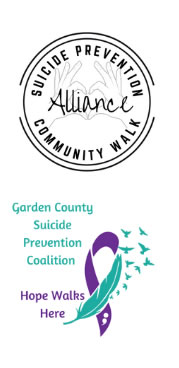
Alliance held their 14th annual Suicide Prevention & Awareness Walk September 28, 2024 with over 20 participants. Janelle Visser, PPHD Health Educator and Injury Prevention coordinator has been coordinating this event with local partners for 15 years. There are several area organizations that sponsor the event. Though there is no cost to walk it is recommended to pre-register, especially if you'd like a t-shirt with a suggested donation of $20 each. Call Janelle at (308)760-6493 to register for the upcoming 2025 walk. The walk raises money by sponsorships and free will donations to support local suicide prevention activities.
Alliance held their 14th annual Suicide Prevention & Awareness Walk September 28, 2024 with over 20 participants. Janelle Visser, PPHD Health Educator and Injury Prevention coordinator has been coordinating this event with local partners for 15 years. There are several area organizations that sponsor the event. Though there is no cost to walk it is recommended to pre-register, especially if you’d like a t-shirt with a suggested donation of $20 each. Call Janelle at 308.760.6493 to register for the upcoming 2025 walk. The walk raises money by sponsorships and free will donations to support local suicide prevention activities.
The second annual Hope Walks Here suicide prevention and awareness community walk event was held at the Garden County High School track on September 13, 2024. There were about 50 participants who walked, painted hope rocks, decorated memorial jugs that glow in the dark, played cornhole, and shared memories of loved ones lost to suicide. Cheri Farris, PPHD Health Educator helped plan and coordinate the event along with several area volunteers, school staff, and Hope Squad advisors. The walk raised money with and free will donations to support local suicide prevention activities.
Below are flyers from each of the 2024 community walks. Stay tuned for 2025 Awareness Walk information coming soon. Please reach out if you’d like to see your community walk flyer here or would like assistance with coordinating a community walk.
Together we can do more to inspire hope and prevent suicide!
Keep scrolling to learn about suicide loss supports.
Suicide Loss Support
Coping with Suicide Loss Support Groups
Panhandle Public Health District (PPHD) and the Panhandle Prevention Coalition (PPC) have been working to implement suicide loss support groups to help provide comfort, camaraderie, and support for those who have lost someone to suicide. This initiative came about due to the needs of our communities and at the requests of suicide survivors. With a mini-grant from the Nebraska State Suicide Prevention Coalition, PPHD was able to sponsor Coping After Suicide facilitator training for a few dedicated volunteers and staff to facilitate groups in their communities across the Panhandle.
The groups are intended to be a confidential, non-judgmental space where those bereaved by a suicide loss can talk freely about something that is highly stigmatized and find some comfort and support from others.
Support group facilitators have lost someone to suicide, too, so they know the pain, questions, and complexity of losing a loved one to suicide. They are there to support others along the journey with empathy and nonjudgment.
New members are warmly welcomed. Even when everyone in the group shares certain things in common, there will always be a diversity of individual experiences. Often, the most profound support can come from the most unexpected source.
The facilitator has a structure and topics in mind for each meeting, and sometimes you may be encouraged, but not required, to journal or complete other exercises between meetings. Still, it's not like taking a course, as there isn't a "curriculum" per se. For the group to feel emotionally safe, everyone needs to trust that what they share will be kept confidential and that everyone will respect one another's privacy.
Current Groups You Can Join:
- Virtual group meets on the first and third Tuesday of each month from 5:30 - 6:30 p.m. via Zoom.
- In-person support group meets every 2nd and 4th Thursday from 6:30 - 7:30 p.m. at 18 West 16th Street in Scottsbluff
Suicide Loss Support Groups are available to any Panhandle resident aged 19 and over who has experienced a loss due to suicide.
If you would like to join either group, register here: https://tinyurl.com/53j6hf7d
Other groups will begin as soon as possible. PPHD and PPC are working to expand this and other suicide prevention and support programs.
Other Support Resources
Thank you for visiting our Suicide Prevention & Support webpage!
Suicide prevention is everybody's business, and through collaborative efforts, we can save lives. By fostering an environment of compassion, awareness, and open dialogue, PPHD and the PPC are working tirelessly to create a community where every individual feels valued and supported together with schools, healthcare organizations, and other partners across the area. Our goal is to ensure that everyone living in the Panhandle has access to the tools, resources, and information needed to have conversations about preventing suicide and to feel comfortable seeking help if needed.
For more information, resources, or to participate or get involved in upcoming events, please reach out to us (308)220-8020 or any of the other numbers above. PPHD's suicide prevention team is here to help in any way possible.
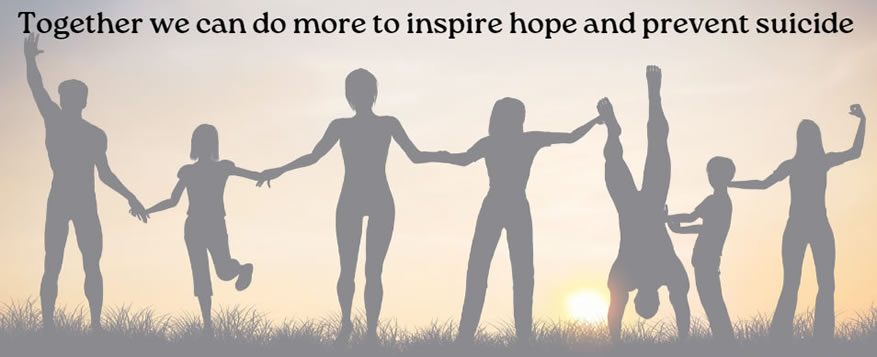
.png)










